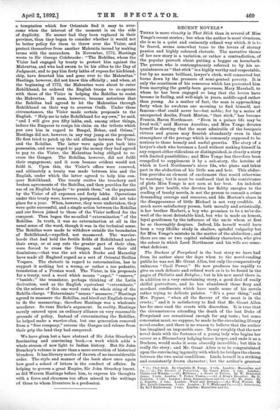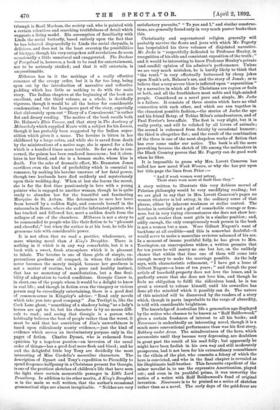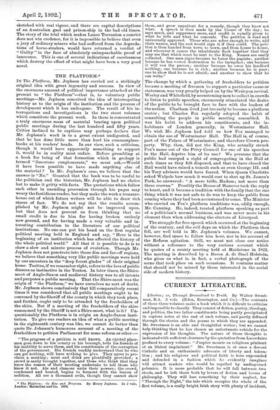RECENT NOVELS.*
THERE is more vivacity in That Stick than in several of Miss Yonge's recent stories ; but when the author is most vivacious, she is so in a quiet and eminently refined way which, it is to be feared, seems somewhat tame to the lovers of stormy passion and highly coloured rhetoric. The narrative theme of her new story is a variation, or rather a contradiction, of the popular proverb about putting a beggar on horseback. The person who is contemptuously referred to by his ac- quaintances as "that stick" is a highly worthy and respectable, but by no means brilliant, lawyer's clerk, well connected but borne down by the pressure of semi-genteel poverty. It is only the scantiness of his resources which has prevented him from marrying the gently-born governess, Mary Marshall, to whom he has been engaged so long that the lovers have become in feeling, and well-nigh in years, middle-aged rather than young. As a matter of fact, the man is approaching forty when he awakens one morning to find himself, not famous—that could never be—but noble ; for by a series of unexpected deaths, Frank Morton, "that stick," has become Francis, Baron Northmoor. "Even in a palace life may be lived well," said Marcus Aurelius; and Miss Yonge devotes herself to showing that the most admirable of the bourgeois virtues and graces may flourish abundantly even in that atmosphere of the peerage which is commonly supposed to be noxious to those homely and useful growths. The story of a lawyer's clerk who becomes a Lord without making himself in any respect either ridiculous or distinguished, is clearly a story with limited possibilities; and Miss Yonge has therefore been compelled to supplement it by a sub-story, the heroine of which is Lord Northmoor's niece Ida, who plans and takes part in the abduction of his little son and heir. This abduc- tion provides an element of excitement that would otherwise be wanting ; but it must be confessed that in the contrivance of plots Miss Yonge is not seen at her best. An indolent girl, in poor health, who devotes her flabby energies to the reading of trashy novels, is not the person to commit a crime demanding courage and resource, and Ida Morton's share in the disappearance of little Michael is not very credible. A much more satisfactory person, both morally and artistically, is her brother Herbert, a boy who promises to be a ne'er-do- weel of the most detestable kind, but who is made an honest, loyal gentleman by the influence of the unzle whom at first he so thoroughly despises. Indeed, Ida herself would have been a very lifelike study in shallow, spiteful vulgarity but for Miss Yonge's mistake in the matter of the abduction ; and there are one or two capital subsidiary characters, who give the colour in which Lord Northmoor and his wife are some- what deficient.
The Duchess of Powysland is the best story we have had from its author since the days when to the novel-reading public he was not Mr. Grant Allen, but only the comparatively unknown "Cecil Power." He now produces too rapidly to give us such delicate and refined work as is to be found in the pages of Philistia and Babylon ; but in his new novel there is, in addition to a very entertaining story, a good deal of really skilful portraiture, and he has abandoned those fiery and mordant condiments which have made some of his novels rather trying to delicate palates. "It's a poor thing," said Mrs. Poyser, "when all the flavour of the meat is in the cruets ; " and it is satisfactory to find that Mr. Grant Allen has for once used the cruets with discretion. It is true that the circumstances attending the death of the last Duke of Powysland are sensational enough for any taste ; but some concession must, we suppose, be made to the circulating-library novel-reader, and there is no reason to believe that the author has imagined an impossible case. To say roughly that the new novel deals with tbe fortunes of a young lady who begins her career as a Bloomsbury lodging-house keeper, and ends it as a Duchess, would make it seem absurdly incredible ; but this is really the story; and Mr. Grant Allen is to be congratulated upon the convincing ingenuity with which he bridges the chasm between the two social conditions. Linda herself is a striking and consistently drawn character ; but the author's greatest • (L) That Stick. By Charlotte M. Yonge. 2 vols. London : Macmillan and Co.—(2.) The Duchess of Pawl/stand. By Grant Allen. 3 vols. London: Ohatto and Windt:L—(3J Mithazan : a Secret of Nature. By W. Bramston Jones. 3 vols. London : T. Fisher Unwin.—(4.) A King's Daughter. By G. Cardella. 3 vols. London : Swan Sonnenschein and Co.—a.) Mr. Jock°. By J. Fogerty. 3 vole. London : Ward and Downey.—(6.) Weak Woman. By Mrs. Lovett Cameron. 3 vols. London : F. V. White and Co.—(7.) Neromnore. By Rol Boldrewood. 3 vols. London : Macmillan and Co.
triumph is Basil Maclean, the society cad, who is painted with a certain relentless and searching truthfulness of detail which suggests a living model. His assumption of familiarity with Linda the social butterfly, based entirely upon the fact that he has behaved disgracefully to Linda the social chrysalis, is delicious, and does not in the least overstep the possibilities
of his type, though his very outspoken self-revelations do seem occasionally a little unnatural and exaggerated. The Duchess of Pcnvysland is, however, a book to be read for entertainment, not to be seriously studied; and that it will entertain, is unquestionable.
Mithazan has in it the makings of a really effective romance of the creepy order, but it is far too long, being spun out by the introduction of narrative and reflective
padding which has little or nothing to do with the main story. The Indian chapters at the beginning of the book are excellent, and the third volume, as a whole, is decidedly vigorous, though it would be all the better for considerable condensation; but the Longmere part of the story, especially that elaborately spun-out "Diary of a Convalescent," is rather
flat and dreary reading. The motive of the book recalls both Dr. Holmes's Elsie Venner, and that story in The Anatomy of Melancholy which supplied Keats with a subject for his Lamia,
though it has probably been suggested by the Indian super- stition which gives it a name. The heroine is bitten in her
childhood by a large cobra, and while she is saved from death by the ministrations of a native sage, she is spared for a fate which is a hundred times more terrible. So far as she is con- cerned, the poison has been rendered innocuous ; but it circu- lates in her blood, and she is a human snake, whose kiss is death. For the sake of dramatic effect, Mr. Bramston Jones sacrifices even the kind of probability which is essential to romance, by making his heroine unaware of her fatal power, though two husbands have died suddenly and mysteriously upon their wedding-day. When at last she learns the secret, she is for the first time passionately in love with a young painter who is engaged to another woman, though he is quite ready to abandon her for the beautiful and fascinating Marquise de St. Aubyn. She determines to save her lover from herself by a sudden flight, and conceals herself in the catacombs in Rome, where she and the infatuated painter, who has tracked and followed her, meet a sudden death from the collapse of one of the chambers. Millman is not a story to be commended to people who like their fiction to be "pleasant and cheerful ;" but when the author is at his best, he tells his gruesome tale with considerable power.
It is not often that we read a prettier, wholesomer, or more winning novel than A King's Daughter. There is nothing in it which is in any way remarkable, but it is a book with a sweet, fresh atmosphere which it is pleasant to inhale. The heroine is one of those girls of simple, un- pretentious goodness all compact, in whom the admirable never becomes the merely insipid, because her goodness is not a matter of routine, but a pure and healthy instinct, that has no monotony of manifestation, but a fine flexi- bility of adaptation to varied conditions. Georgie Carew is, in short, one of the people whom it would be a delight to know in real life ; and though in fiction even the vinegary or vicious person may be exceedingly entertaining, there is a good deal of common-sense in Kingsley's advice : "Read only novels which take you into good company." Jim Trethyl is, like the Cock Lane ghost, "something of a shadowy being," as a lady's heroes are apt to be, but his character is by no means diffi- cult to read ; and seeing that Georgie is a person who habitually believes the best of people rather than the worst, it must be said that her conviction of Jim's unworthiness is based upon ridiculously scanty evidence,—just the kind of evidence which serves an incriminatory purpose only in the pages of fiction. Charles Dysart, who is redeemed from cynicism by a hopeless passion—an inversion of the usual order of things—has a good deal more flesh and blood; and he and the delightful little boy Tony are decidedly the most interesting of Miss Cardella's masculine characters. The description of Dysart and Tony's expedition to Piccadilly to spend fivepence-halfpenny in a Christmas present for Georgie, is one of the prettiest sketches of children's life that have seen the light since certain memorable passages in Little Lord l'auntleroy. In addition to its other merits, A King's Daughter is in the main so well written, that the author's occasional grammatical slips are almost inexplicable. "Neither are very
satisfactory pursuits," "To you and I," and similar construc- tions, are generally found only in very much poorer books than this.
Christianity and supernatural religion generally will probably survive the flouts and jeers with which Mr. Fogerty has besprinkled his three volumes of disjointed narrative. Mr. Jock° is "respectfully dedicated to Professor Huxley, in recognition of his able and consistent exposition of the truth;" and it would be interesting to know Professor Huxley's private (and candid) opinion of his admirer's performance. Unless we are very much mistaken, he is hardly likely to think that "the truth" is very effectually buttressed by cheap jokes upon Noah's ark, Balsam's ass, and the story of Jonah ; or to believe that a very severe blow is inflicted upon " superstition " by a narrative in which all the Christians are rogues or fools or both, and all the freethinkers most noble and high-minded people. Considered as a novel pure and simple, Mr. Jock° is a failure. It consists of three stories which have no vital connection with each other, and which are ran together in the clumsiest possible fashion,—the stories of Jocko the ape and his friend Betsy, of Tobias Miles's misadventures, and of Paul Ferrier's love-affair. The first is very slight, but it is really pretty, and will be relished by all lovers of animals ; the second is redeemed from fatuity by occasional humour; the third is altogether flat ; and the result of the combination of the three is one of the most shapeless works of fiction that has ever come under our notice. The book is all the more provoking because the sketch of life among the nailmakers in the Black Country proves that Mr. Fogerty can do good work when he likes.
It is impossible to guess why Mrs. Lovett Cameron has called her new novel Weak Woman, or why she has put upon her title-page the lines from Prior :—
"And if weak women went astray, Their stars were more at fault than they."
A story written to illustrate this very dubious morsel of Priorian philosophy would be very unedifying reading; but we are glad to say that in Mrs. Lovett Cameron's pages no woman whatever is led astray, in the ordinary sense of that phrase, either by inherent weakness or stellar control. The heroine is certainly not a girl of remarkable courage or firm- ness, but in very trying circumstances she does not show her- self much weaker than most girls in a similar position; and, oddly enough, the only conspicuously weak person in the book is not a woman but a man. Were Gilbert Nugent's want of backbone at all credible—and this is somewhat doubtful—it would serve to make a masculine reviewer ashamed of his sex. In a moment of insane youthful folly, he has given to Mrs. Torrington, an unscrupulous widow, a written promise that for ten years he will marry no one but her, on the unlikely chance that within that time one of them will come into enough money to make the marriage possible. As the lady says, with characteristic refinement, "I have got a lease of Gilbert Nugent—a lease of ten years ; " and though the poor article of 'leasehold property does not love the lessee, and is perfectly aware that she does not love him, and though he feels no obligation to fulfil the ridiculous bond, he is too great a coward to release himself, until his cowardice has done all the mischief which it possibly can do. The nature of this mischief will be discovered by the readers of a story which, though in parts improbable to the verge of absurdity, is told with considerable brightness.
The knowledge of Australian life a generation ago displayed by the writer who chooses to be known as "Rolf Boldrewood," gives a certain freshness of interest to all his books; and Nevermore is undoubtedly an interesting novel, though it is a much more conventional performance than was his first story, Robbery under Arms. The misadventures of the hero, which accumulate until they become very depressing, are doubtless in great part the result of his mad folly; but apparently he might have been foolish in his own way and still moderately prosperous, had it not been for his extraordinary resemblance to the villain of the plot, who commits a felony of which the hero is convicted, and who in the final chapter is revealed as his illegitimate half-brother. This favourite expedient of the minor novelist is, to use the expressive Americanism, played out ; and even in its youthful prime, it was unworthy the notice of a writer with Rolf Boldrewood's fund of original invention. Nevermore is to be praised as a series of sketches rather than as a novel. The early days of the gold-fever are
sketched with real vigour, and there are capital descriptions of an Australian gaol and prison-ship in the bad old times. The story of the trial which makes Lance Trevanion a convict does not win credence, for it is impossible to believe that even a jury of ordinary miners who had suffered from the depreda- tions of horse-stealers, would have returned a verdict of " Guilty " in the face of absolutely unimpeachable proof of innocence. This is one of several indications of carelessness which destroy the effect of what might have been a very good novel.




































 Previous page
Previous page